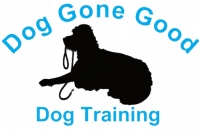Dog-gone-good

Our goal is to provide you with the most up-to-date, integrated and common sense approach to dog training. California has many dog training schools featuring a variety of approaches and philosophies.
Mike Wombacher, founder and head trainer of Dog Gone Good!, has an extensive background in all of these approaches and from them has crafted a flexible program that is committed to helping owners in a sensible, fast-paced way that draws on the best of everything in line with the needs of their dog. His approach is not one-dimensional, insisting the “we only do it this way,” or “we would never do that.” Mike has long felt that holding such a “dogmatic” position in relation to training is a reflection of the fact that the trainer is more committed to his or her approach than they are to helping the dog and its owner. In fact, any approach that defines itself by the words “only” or “never” should be immediately suspect. A good trainer will have a toolbox of remedies available that can be creatively integrated and brought to bear in an infinite variety of combinations to produce fast results with your dog.
Mike’s training approach emphasizes positive reinforcement while retaining the benefits of structure, guidance and authority. His motto is “maximize the positive, minimize the negative and be realistic.” In his private training he seeks to tailor an approach that takes into account both the owner’s and dog’s temperament and in designing his group classes he has combined the best of what he has learned from both his clients and his mentors in the many years of his involvement with dog training. California, as well as the rest of the country, has in recent years seen an explosion of different schools of thought regarding dog training and while this is by and large a good thing it can be disorienting to the lay dog owner. This is why it is engaging someone familiar with a variety of approaches is key in educating yourself and your dog.
From a philosophical standpoint the most troubling trend in dog training in recent years has been the rise of the so-called “positive-only” training philosophy. In this approach it is never permissible to reprimand the dog for any reason. Instead the owner is instructed to ignore bad behaviors while positively reinforcing, usually with a treat, desirable behaviors. This often has odd consequences. For instance, a common remedy for barking in this approach involves simply letting the dog bark until he gets tired of it and once he desists reward him with a treat for his silence. The most common result is a dog that learns that if he barks for a while, the stops he gets a treat thus sending the behavior through the roof. Not exactly the desired result. The larger point is that by ignoring bad behaviors we deprive the dog of important information, that is, when he has crossed a behavior boundary. Only positively reinforcing the opposite behavior is, at best, half the picture. The full picture includes both and will usually yield dramatic results.
In all fairness, it must be said that the burgeoning emphasis on positive reinforcement training is a direct response to the “yank and jerk” training so common in the foregoing decades and even centuries. As such it has made an enormously “positive” impact on the dog-training world as a whole. However, in recent years, with political correctness at all time highs in every area, the word “only” has been added to the positive resulting in an impact that is decidedly less than positive. In dog training California has led the way in this trend. Most California dog training schools these days advocate this approach and while it may work with some dogs the more common result is an adolescent dog that is out of control and an owner that is dis-empowered from taking corrective measures because he or she has been told that any form of reprimand amounts to abuse. Often, when such an owner asks about the importance of structure, guidance and authority and playing the role of the pack leader he or she is told that “we no longer believe in the dominance model of dog behavior” as if simply saying such a thing made it so.
Unfortunately, at least in Mike’s experience, the single leading cause of behavior problems in dogs is the owner’s unwillingness to provide structure, guidance and authority for their dog and a misunderstanding of dominance in which it is equated with aggression. Dominance definitely does not equal aggression. It means providing direction through fairness, confidence and most importantly, consistency. Of course, within those outlines there is infinite room for positive reinforcement but cut away is the insidious concept of “only.” It is, in Mike’s view, the willingness to apply the balance of these principles intelligently that we give our dogs the true love they deserve from us.
Perhaps in returning to a balanced approach to dog training, California can lead the way once more, as it has in so many other fields. It is certainly what we at Dog Gone Good! are endeavoring to do.

comments